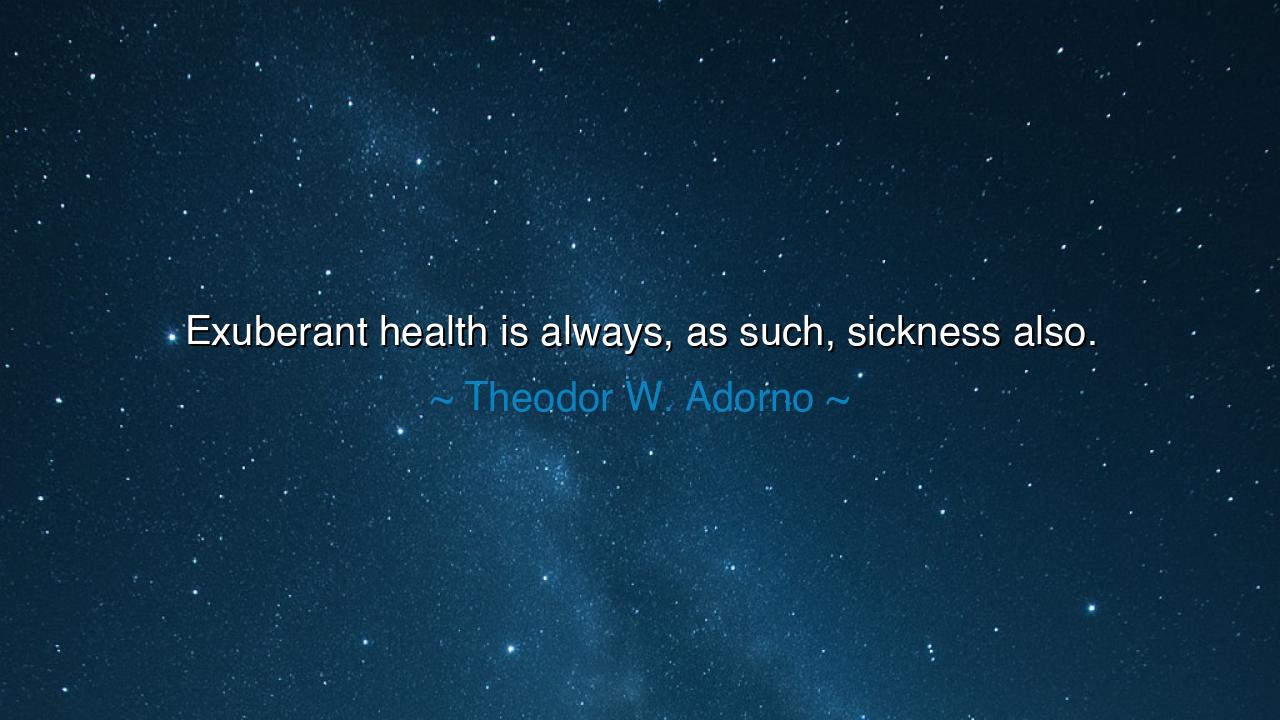
Exuberant health is always, as such, sickness also.






“Exuberant health is always, as such, sickness also.” — thus wrote Theodor W. Adorno, philosopher of the fractured modern world, whose thoughts pierced beyond the surface of things to the uneasy balance beneath. In this cryptic and haunting statement, Adorno reminds us that excess, even of what seems good, carries within it the seed of its own undoing. For in nature, all forces — vitality and decay, creation and destruction, health and sickness — are bound together like night and day. The one cannot exist without the other, and the moment one overflows its rightful measure, it transforms into its opposite.
To say that exuberant health is also sickness is to unveil a profound truth about the human condition. When strength becomes arrogance, when vigor becomes restlessness, when the pursuit of wellness becomes obsession, the balance of life is lost. The body may appear powerful, but the spirit grows weary. The mind may glow with energy, but it burns too hot, consuming the peace that sustains true vitality. In this way, Adorno teaches that health is not merely the abundance of energy or the perfection of form, but the harmony between body and soul — the quiet equilibrium that allows one to live without overreaching, to thrive without dominating.
The origin of this wisdom lies in the philosopher’s world — the twentieth century, an age intoxicated by progress, speed, and power. Adorno lived in a time when humanity, believing itself stronger and healthier than ever before, plunged into wars and mechanization that nearly destroyed civilization itself. The machines that promised prosperity brought suffering; the ideologies that glorified human strength became engines of oppression. In this context, Adorno’s words take on prophetic meaning: that unchecked vitality, the pursuit of health and perfection without conscience, becomes sickness — the sickness of hubris, of losing touch with humility and frailty, those necessary companions of wisdom.
Consider the tale of Icarus, the ancient symbol of youthful vigor unrestrained by wisdom. With wings of wax, he soared higher than any mortal before him, drunk on the exuberance of flight. Yet in his ecstasy, he forgot measure; he flew too close to the sun, and his wings melted, plunging him to death. What was this fall but the natural consequence of excess? His flight was his sickness, his vitality his undoing. So too in human life: when health turns to vanity, when strength forgets its limits, the downfall is inevitable. Even the ancients warned, “Nothing in excess” — for excess, however noble in origin, distorts the harmony that sustains life.
Adorno’s insight also applies to the modern cult of wellness — the endless striving for perfect bodies, eternal youth, unbreakable productivity. In chasing health as an ideal, many forget the gentleness of being human. They push beyond rest, starve in the name of fitness, and exhaust themselves in the pursuit of vitality. What they call health is often another form of sickness — the sickness of fear, of vanity, of disconnection from the deeper rhythms of life. The truly healthy are not those who never tire or age, but those who live in tune with nature’s cycles of growth and decline, who know that fragility is not failure, but part of being alive.
There is also a spiritual warning here. The one who believes himself fully “healthy” — in body, mind, or morality — risks losing empathy for those who struggle. The illusion of perfection blinds the heart to the suffering of others. History shows this again and again: regimes that glorified physical strength and racial purity committed horrors in the name of health and order. Adorno, having lived through the age of fascism, understood that the worship of health can become a philosophy of cruelty — when society decides who is “fit” and who is “weak,” who deserves to live and who must perish. Thus, he reminds us: to be fully human is to embrace imperfection, to recognize that weakness and compassion are also forms of strength.
The lesson, then, is one of balance and humility. Seek health, but not as conquest; nurture strength, but not at the cost of tenderness. Remember that rest is part of growth, that gentleness sustains power. Let not your pursuit of perfection make you blind to the fragile, beautiful truth of impermanence. For health, in its truest form, is not the denial of sickness but the wisdom to live peacefully with life’s dualities — to breathe deeply even when pain lingers, to find serenity amid struggle.
So, my children of the modern age, heed Adorno’s words as both a warning and a guide. Do not mistake abundance for balance, nor energy for wholeness. The flame that burns too bright consumes itself, but the steady light endures through the night. Let your health be radiant, but let it also be humble. For only when strength bows to understanding, and exuberance yields to moderation, will the body and the soul dwell together in true harmony — the golden mean between vitality and peace, between life and its necessary shadow.






AAdministratorAdministrator
Welcome, honored guests. Please leave a comment, we will respond soon